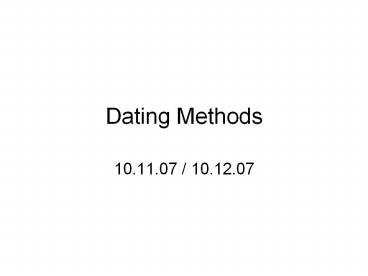Dating Methods PowerPoint PPT Presentation
Title: Dating Methods
1
Dating Methods
- 10.11.07 / 10.12.07
2
Essential Question
- How can scientists determine the ages of geologic
material?
3
What are strata?
- Layers of rock
4
Strata
5
Strata
6
Folded strata
7
What is an angular unconformity?
- When rock deposited in horizontal layers is
folded or tilted, then eroded, and then covered
by more horizontal layering
8
Angular unconformity
9
Angular unconformity
10
What is the law of cross-cutting relationships?
- The fault or igneous intrusion is always younger
than the rock layer it cuts through.
11
Cross-cutting relationship
12
What are nonconformities?
- Unstratified igneous or metamorphic rock is
eroded and then covered by layers of sediment.
13
Nonconformity
14
Nonconformity
15
What are disconformities?
- The boundary between younger sedimentary rock
layers deposited on an eroded layer of older
sedimentary rock
16
disconformity
17
What are faults?
- A break or crack in Earths crust along which
rocks shift their positions
18
Fault
19
Earth history in 24 hours
scale 1 sec 52,000 years 1 min 3,125, 000
yrs 1 hour 187,500,000 yrs
20
What is correlation?
- Matching geologic materials from different
regions to ages
21
(No Transcript)
22
(No Transcript)
23
(No Transcript)
24
(No Transcript)
25
Correlating tree rings
26
Rates of erosion and deposition
- Measure the recent rates
- Estimate age of geologic feature
- Becomes less reliable as age increases
- Most reliable within last 10,000-20,000 years
27
Niagara Falls
28
Varve count
- Similar to counting tree rings
- Count annual layers of sediment
- Common in glacial lake beds
- Distinguished by layers of dark fine particals
and light heavy particles
29
(No Transcript)
30
Radiometric dating
- A method of determining the absolute age of an
object by comparing the relative percentages of a
radioactive (parent) isotope and a stable
(daughter) isotope. - Atoms of the same element with different numbers
of neutrons are called isotopes.
31
Radioactivity and radiometric dating
- Radiometric dating
- Half-life the time for one-half of the
radioactive nuclei to decay - Requires a closed system
- Cross-checks are used for accuracy
- Complex procedure
- Yields numerical dates
32
The radioactive decay curve
33
Dating sedimentary strata using radiometric
dating
34
Radioactivity and radiometric dating
- Carbon-14 dating
- Half-life of only 5730 years
- Used to date very recent events
- Carbon-14 produced in upper atmosphere
- Incorporated into carbon dioxide
- Absorbed by living matter
- Useful tool for anthropologists, archeologists,
historians, and geologists who study very recent
Earth history
35
(No Transcript)

